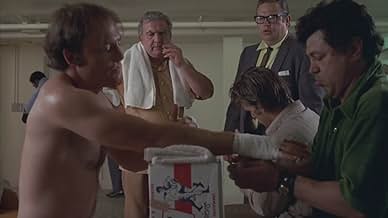Nicholas Colasanto(1924-1985)
- Actor
- Director
- Additional Crew
Nicholas Colasanto, the actor and television director who achieved his
greatest success as "Coach" on the TV series
Cheers (1982) at the end of his
career, was born January 19, 1924 in Providence, Rhode Island, one of
seven children. He attended Providence's Central High School but did
not graduate due to World War II, as he joined the Navy. After being
discharged at the end of the war, Colasanto returned to Little Rhody
and finished his high school education, then went on to Bryant College,
earning money for tuition and board by working construction jobs. He
worked as an accountant for an oil company after graduating from Bryant
in 1949.
At the age of 28, he saw Henry Fonda perform on Broadway and was infected by the acting bug. He joined a theater company in Phoenix, Arizona before moving back to New York, where he performed in off-Broadway productions and appeared in TV commercials. He relocated to Hollywood in 1965 and began to appear on TV, were he also made his mark as a TV director. Eventually, he directed over 100 episodes of series TV in the 1960s and 70s, including episodes of Bonanza (1959), Columbo (1971), S.W.A.T. (1975) and Starsky and Hutch (1975). His two most memorable film roles were the the boxing manager in John Huston's Fat City (1972) and the mob boss in Martin Scorsese's Raging Bull (1980).
Colasanto was primarily a dramatic actor but the producers of the TV comedy Cheers (1982) cast him as Ernie "Coach" Pantusso, the absent-minded and dumb but lovable bartender. The role made him famous and he earned an Emmy nomination as Outstanding Supporting Actor in a Comedy Series each of the three years that he appeared on the show.
Sadly, at the height of his fame, he died from a heart ailment at his home on February 12th, 1985. Much beloved by the cast, the picture of the Apache warrior Geronimo that Colasanto had kept in his dressing room as a good luck charm was hung on the wall of the primary set of Cheers (1982). The picture of was not only a tribute to "Nicky", as he was known to his friends and co-workers, but was a reminder that "Coach" was still around. On the final episode of Cheers (1982), eight years after his death, Nicky Colasanto was acknowledged when series star Ted Danson, in the final scene, straightens the Geronimo picture before walking off stage for the last time.
At the age of 28, he saw Henry Fonda perform on Broadway and was infected by the acting bug. He joined a theater company in Phoenix, Arizona before moving back to New York, where he performed in off-Broadway productions and appeared in TV commercials. He relocated to Hollywood in 1965 and began to appear on TV, were he also made his mark as a TV director. Eventually, he directed over 100 episodes of series TV in the 1960s and 70s, including episodes of Bonanza (1959), Columbo (1971), S.W.A.T. (1975) and Starsky and Hutch (1975). His two most memorable film roles were the the boxing manager in John Huston's Fat City (1972) and the mob boss in Martin Scorsese's Raging Bull (1980).
Colasanto was primarily a dramatic actor but the producers of the TV comedy Cheers (1982) cast him as Ernie "Coach" Pantusso, the absent-minded and dumb but lovable bartender. The role made him famous and he earned an Emmy nomination as Outstanding Supporting Actor in a Comedy Series each of the three years that he appeared on the show.
Sadly, at the height of his fame, he died from a heart ailment at his home on February 12th, 1985. Much beloved by the cast, the picture of the Apache warrior Geronimo that Colasanto had kept in his dressing room as a good luck charm was hung on the wall of the primary set of Cheers (1982). The picture of was not only a tribute to "Nicky", as he was known to his friends and co-workers, but was a reminder that "Coach" was still around. On the final episode of Cheers (1982), eight years after his death, Nicky Colasanto was acknowledged when series star Ted Danson, in the final scene, straightens the Geronimo picture before walking off stage for the last time.






































